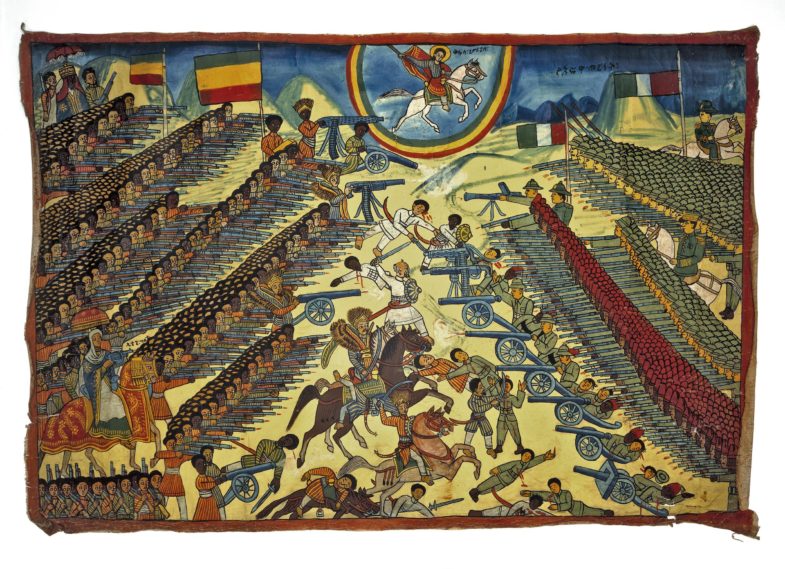[00:00:01] Amanuel In the late 1890s, a man named Blatta Gebre Egziabeher went from being the model colonial subject in Eritrea to being tried for treason. In May of 1889, Italy and emperor Menelik II of Ethiopia signed the Treaty of Wuchale, granting Italy the northernmost territories of the Ethiopian Empire, including modern day Eritrea. In return, Ethiopia received a sum of money, 30,000 muskets and 28 cannons. Eritrea was officially colonized the following year and many residents had little choice but to work for the Italians. Among these Eritreans was Blatta Gebre Egziabeher.
[00:00:48] Professor Dirar Blatta Gebre Egziabeher was born 30 years before Eritrea was established as an Italian colony, officially at least in January 1890.
[00:01:01] Amanuel That’s Professor Dirar, of the University of Macerata, in Italy. Blatta Gebre Egziabeher worked as a civil servant during the early colonial period. He was a well-educated intellectual, able to read and write in five languages: Tigrinya, Arabic, Amharic, Ge'ez, and Italian. Gebre Egziabeher distinguished himself as a colonial soldier in several battles, including the Battle of Adwa in 1896 on the side of the Italians, and during the suppression of the Bahta Hagos colonial revolt in 1894. He became the official interpreter of the Eritrean colonial government in 1897 and often crossed the border to Ethiopia with Italians to conduct foreign relations and to negotiate peace talks. Slowly, he gained the respect of many Italians.
[00:01:54] Professor Dirar In the Italian early accounts of Blatta Gebre Egziabeher, he is depicted as the example of the ideal colonial subject, which is civilized, and which acknowledged the colonial rule, the colonial hegemony.
[00:02:10] Amanuel He served as the official interpreter for just two years before his frustrations with the Italians started to grow.
[00:02:17] Professor Dirar People who were educated, they would have always been second class citizens. So intellectuals like Blatta Gebre Egziabeher could not become more than a good translator, a good interpreter in the colonial administration -- definitely not a leader. So those people wanted to be, first of all, actors of their own life, they wanted to take their own lives in their own hands without being always subjected to the filters of colonial biases and colonial racist stereotypes and restricted access to the labor market.
[00:02:56] Amanuel Blatta Gebre Egziabeher was also appalled by the mistreatment of Eritrean ascari, or native colonial troops.
[00:03:04] Professor Dirar There was a lot of suspicion, a lot of bias against the use of Africans in the colonial troops and in this case, particularly of Eritreans. So the main concern was about their reliability, their loyalty. The fear was that once those people were trained on the warfare technique, on the use of weaponry, of modern military strategies, then they could have turned their back and use the same skills against the colonial masters.
[00:03:35] Amanuel And so, the Italian military used violence to train and punish native colonial troops, to ensure loyalty out of fear. Professor Tekeste Negash of Uppsala University in Sweden writes about a watershed moment in Blatta Gebre Egziabeher’s life. He saw an Italian carabiniere instruct an Eritrean ascari to “pour (kerosene) over [an ascari in the throes of death] and burn him”. Negash writes that Gebre Egziabeher “on hearing the screams of the dying man, ran to him and put out the fire”, but “the man did not survive”. Blatta Gebre Egziabeher remarked:
[00:04:15] Blatta Gebre Egziabeher “I have never before seen such cruelty and evil.”
[00:04:21] Professor Dirar It is very much possible that he might have witnessed episodes of brutality the way he described them. And as I say, the treatment of colonial troops at this stage was still very, very disorganized, very much affected by this kind of racist bias and stereotype.
[00:04:44] Amanuel Blatta Gebre Egziabeher began writing letters to Ethiopian officials imploring outside interference. Of these letters, the most momentous was his letter to the emperor of Ethiopia, Menelik II. He expresses his frustration with the emperor for selling Eritrea to the Italians, and bemoans the conditions Eritreans faced under Italian rule.
[00:05:09] Blatta Gebre Egziabeher By the Treaty of Wuchale, you sold your mother country, Ethiopia. Why do you become two tongues in one person and two heads in one crown? Why wouldn't you liberate our brothers according to Your word. Instead of such an indecisive reign which will lead to the destruction of Ethiopia, it would be wise to relinquish your throne to someone who could do better.
[00:05:35] Professor Dirar It was obvious to look at the most important and the only independent polity in the region, which was Ethiopia, under Menelik, so it made sense from his perspective to call for an engagement.
[00:05:52] Blatta Gebre Egziabeher Your Majesty, King of Kings, I did not write this letter to you to humiliate and offend the Lord’s most high anointed, but because I could no longer tolerate the sadness of seeing my countrymen, sons of Ethiopia, reduced to the state of slavery by their foreign rulers, far worse than that of the people of Israel. I wanted the above account, like a sword, to pierce your heart.
[00:06:18] Amanuel On July 6th, 1899, a letter from Ras Makonnen -- an important political figure in Ethiopia -- was on its way to Blatta Gebre Egziabeher when it was intercepted by the Italians. Already suspicious of Gebre Egziabeher, the Italians translated the letter in private. They discovered that parts of the letter were written in code and were critical of the Italians. They passed the letter to Gebre Egziabeher without mention of their findings, and then later requested that it be returned. Gebre Egziabeher doctored the letter and furnished a sanitized version, and the Italians immediately began an inquiry. They found numerous political writings in Blatta Gebre Egziabeher’s home, including his letter to Menelek II and several other letters written in code. Gebre Egziabeher was accused of political espionage and of disclosing to Menelik “highly classified information”. Blatta Gebre Egziabeher’s case was famous not only in Eritrea but also in Italy, where his trial was widely followed and covered in Italian newspapers. The Italian media painted Gebre Egziabeher as an archetypal traitor of the colonial government. Shortly after Gebre Egziabeher’s arrest, he was sent to an Italian prison in Naples. In November 1899, for reasons that are still unclear, Blatta Gebre Egziabeher was transferred to the colonial penitentiary of Nokra, Eritrea. Under the guise of fetching water from the wells, a number of Eritrean prisoners killed an Italian guard, took another as hostage, seized several weapons, and opened the prison gates to free about one hundred prisoners, including Blatta Gebre Egziabeher. The anti-colonial figure, along with several other prisoners, then travelled by sea to Tigray, a region in northern Ethiopia. Gebre Egziabeher and the other prisoners were welcomed by Ras Makonnen himself. Once in Tigray, Blatta Gebre Egziabeher became an important political advisor to the emperor of Ethiopia. He remained a prolific writer and a prominent intellectual figure. He helped develop the newspaper culture in Ethiopia and wrote numerous works including a book, a memoir, and myriad poems. Many of Blatta Gebre Egziabeher’s poems warned of an impending European invasion of Ethiopia:
[00:08:51] Blatta Gebre Egziabeher Now one must be careful before the eagle arrives, who snatches and takes away. He does not pardon the aged or pity the children. When he comes, tis the bitterness of the bile. They say he never gives a burial place. If indeed you do not believe me, look at Asmara, Eritrea.
[00:09:15] Amanuel Gebre Egziabeher stressed the importance of regional unity and political awareness in combating colonial threats:
[00:09:23] Blatta Gebre Egziabeher Mr Unity having reigned, if he rule over us no enemy will hurt us; envious persons will not be many. Let us become quite strong. Let counsellors abound; that our mind may not be undecided, so that the enemy may not win on the day of our encounter. Let us examine history; let us read the newspaper; let us learn languages; let us regard maps. Tis this which opens the people's eyes.
[00:10:03] Amanuel Blatta Gebre Egziabeher passed away in 1914, and unfortunately, his suspicions were proven right. Just 21 years after he passed, Ethiopia was invaded by Italy. Hailed as a hero in both Eritrea and Ethiopia, Blatta Gebre Egziabeher’s transformation from model colonial subject to anti-colonial leader influenced generations of Eritrean revolutionaries in their fight against Italian colonialism. This audio project was produced for the Religion, Race and Democracy Lab at the University of Virginia. With help from the lab’s senior producer, Emily Gadek and the lab's editor, Kelly Hardcastle Jones. Special thanks to Afona ‘AJ’ Gebre, Professor Uoldelul Chelati Dirar, Professor Tekeste Negash, Professor Irma Taddia, and Regat Gebremichael. Music for this project comes from Blue Dot Sessions. You can find more documentary research on religion, race and democracy, at religion lab dot Virginia dot edu.




